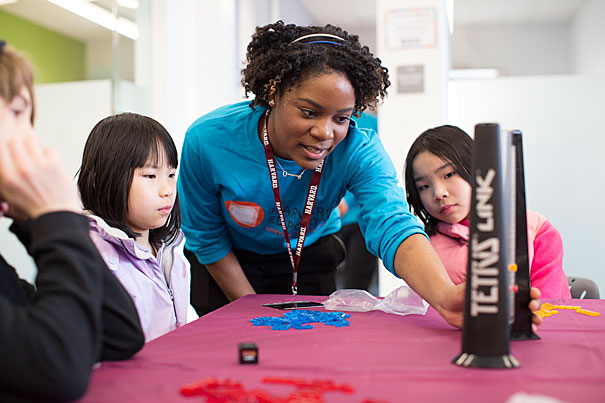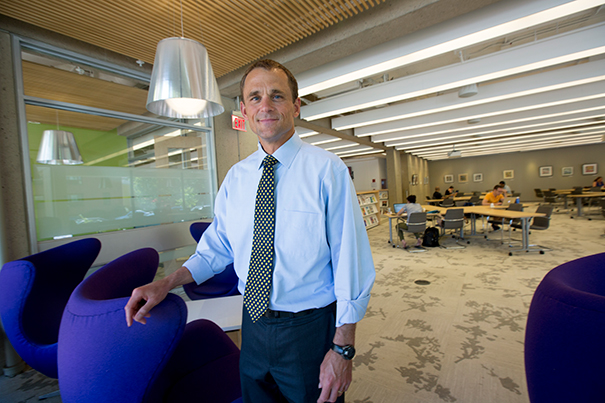
The Saul Zaentz Charitable Foundation gift will focus on advancing early childhood education, building on the Harvard Graduate School of Education’s renowned Center on the Developing Child.
File photo by Rose Lincoln/Harvard Staff Photographer
Ed School launches major early childhood initiative
Gift from Saul Zaentz Charitable Foundation supports first program of its kind
Harvard Graduate School of Education (HGSE) Dean James Ryan announced today the Saul Zaentz Early Childhood Initiative at HGSE — a major investment in transforming early childhood education in the United States. The first initiative of its kind, it will distinguish HGSE as a national leader in this field, building significantly on the pathbreaking work of existing faculty and the renowned Center on the Developing Child at Harvard University.
The initiative is supported by a $35.5 million gift from the Saul Zaentz Charitable Foundation, is one of the largest gifts ever given to a university to focus on advancing early childhood education, and the largest gift in HGSE’s history. The Zaentz Initiative will pursue interlocking strategies for impact: conducting research to drive policy and practice, strengthening the field through high-quality professional learning, cultivating new leaders in the field, and bringing credible evidence to bear on public policy affecting young children. By building and strengthening partnerships with organizations in the field and internal collaborators such as the Center on the Developing Child, the Initiative is committed to improving and expanding early childhood education so all children have the opportunity to learn and thrive.
“The Saul Zaentz Early Childhood Initiative is a bold and forward-thinking investment in the field of early childhood education. It is perfectly aligned with HGSE’s mission of expanding educational opportunity and improving outcomes, especially for our most vulnerable children,” said Ryan. “The initiative will provide early childhood educators, from teachers to leaders, with high-quality, high-impact professional learning opportunities drawing on evidence from groundbreaking new research.
“Importantly, it will tap into the strength of our faculty in early childhood, including Professor Nonie Lesaux and Associate Professor Stephanie Jones, allowing us to build a strong evidence base for pre-K program improvement, policy, and advocacy. It will also leverage the broader work of the Center on the Developing Child and its Frontiers of Innovation movement, under the direction of Professor Jack Shonkoff. Finally, the gift’s critical support for student financial aid and attracting outstanding faculty will help HGSE build its capacity to make an impact. I am grateful to the Saul Zaentz Charitable Foundation for this historic gift, which is a fitting and lasting tribute to the life of Saul Zaentz.”

The Saul Zaentz Charitable Foundation, launched in 1997, is named for Saul Zaentz (1921–2014). A son of immigrants who grew up in poor circumstances, Zaentz created the world’s largest independent jazz record company, Fantasy Records, before becoming a film producer who won Best Picture Academy Awards for “One Flew Over the Cuckoo’s Nest,” “Amadeus,” and “The English Patient.”
“Saul Zaentz used his foresight and collaborative abilities to bring together diverse talents in making his films,” said Alan “Mickey” Hammerman ’55, president of the foundation. “We believe that HGSE will use those same attributes in creating, establishing, and building the Saul Zaentz Early Childhood Initiative.”
“Harvard is committed to fulfilling the promise of opportunity for all through education,” said Harvard University President Drew Faust. “The Zaentz Initiative represents powerful, visible leadership to the field of early education. It will support faculty and students who care deeply about improving outcomes for very young children, and will become an essential source at the University and across the country for scholarship, partnership, and professional learning.”
The Harvard Early Learning Study
Under Lesaux and Jones’ direction, HGSE will launch the Harvard Early Learning Study, an unprecedented, population-based study in early childhood. Drawing on successful models from medical and public health research, this five-year study will follow a representative cohort of 3-year-olds that reflects the linguistic, socioeconomic, and racial diversity of today’s population. The study will shed light on aspects of children’s development in several areas —language, cognition, social-emotional development, and neurophysiology — that are sensitive to the nature and quality of early learning environments.
“Developmental science makes the benefits of early education clear, but our research base has not kept pace with the changing demographics of today’s childhood population, one that is increasingly diverse and growing up in an era of great economic instability. We still need a much better understanding of what early education models work for whom, and under what conditions,” Lesaux said. “The scope of the study — following children over time and across their many contexts — is unprecedented and will address many of today’s most pressing questions, therefore informing targeted and innovative policy solutions for impact.”
The study will address key questions facing today’s policymakers and practitioners, particularly those about scale, the long-term impacts of early education, and the essential ingredients for successful models.
The Saul Zaentz Academy for Professional Learning in Early Childhood
Addressing a recognized need to cultivate expertise across the sector, HGSE will also establish the Saul Zaentz Academy for Professional Learning in Early Childhood, dedicated to developing the knowledge and skills of people in early childhood education.
The Zaentz Academy will offer a range of programs, including in-person and online learning opportunities, institutes, certificate programs, and webinars for early childhood educators, leaders, and policymakers. The programs will be grounded in a “growth-in-practice” model of professional learning in which participants learn cycles of inquiry, co-construct solutions to specific problems of practice, analyze relevant cases and policies for action, and apply learning to their specific situations. They will also form networks and communities of practice, which will provide a continuous loop of insight and feedback to researchers at HGSE and throughout the field.
“We know that the success of early education rests on its quality, but quality itself depends upon the educators and leaders on the ground. What is often missing from the national discussion about early learning is how, exactly, we are to enhance the capacity of the adults whose everyday work is to put initiatives and policies into action,” Jones said. “As part of the overall initiative, the Saul Zaentz Academy for Professional Learning will function as a go-to place for policymakers, administrators, and educators to access opportunities for professional growth, grounded in the cutting-edge science of early learning and development, and systems-level improvement.”
The Saul Zaentz Fellows Program
The initiative will also enable HGSE to prepare a new generation of leaders in early childhood education with the knowledge, tools, and networks to change and impact the field. Through the Saul Zaentz Fellows Program, HGSE will attract students invested in early childhood education, offering eight new master’s fellowships and one new fellowship in the Doctor of Education Leadership Program. Zaentz Fellows will participate in a co-curriculum that draws them together across programs; connects them to faculty involved in the initiative; offers related research, mentorship, and internship opportunities with individual faculty and at the Center on the Developing Child; and helps build a peer alumni network as they pursue careers in early childhood education.
The gift to support the Saul Zaentz Initiative also includes funding for two new endowed chairs at HGSE — one for a tenured or tenure-track faculty member, and one for a practice-based faculty member — who will play key roles in advancing the goals of the Initiative.




